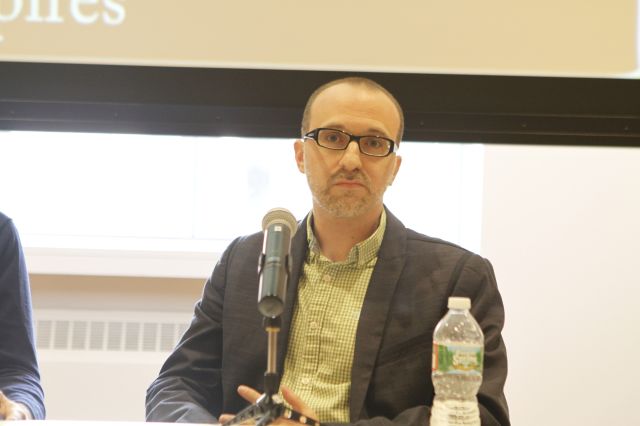Dan Saltzstein has worked at the New York Times since 1999. He is currently an editor in the Travel section. His writing and photography has appeared in the Travel, Dining, Arts, Books, and Metropolitan sections. He graduated from Amherst College and lives in Woodside, Queens, with his wife and daughter.
How did you get started traveling?
When I was a kid, my parents had flexible schedules (college professor father, psychologist mother), so we traveled a lot: France, Italy, Mexico, Canada, Netherlands, Israel. I can’t say I appreciated much of it at the time, surly pre-teen and teen that I was, but it (and my parents’ enthusiasm) probably planted some sort of seed. In 1998 I quit my post-college job and traveled solo for about 6 months in Morocco and Europe. It was a transformative experience. I still have my diary from that trip and reference it periodically for stories. The month I spent in Morocco was especially memorable. (It was also the longest period I’d ever spent away from New York, besides college.)
How did you get started writing?
My first byline was a short food article in Time Out: New York sometime around 1999. That was the same year I started at the New York Times and I’ve written for various sections of the paper over the years, though never very regularly.
What do you consider your first “break” as a writer? As an editor?
I took a sort-of backdoor into the Times, working at a short-lived web site called New York Today. Within a year or so, that got folded into nytimes.com, where I worked as a producer and editor for 10 years. About 5 years ago I made the counter-intuitive switch to print (“you’re going from web to print?!” — my response was always that I wanted to deal with content, and didn’t care what platform it was on). A slot was open in Travel and I grabbed it.
A few years ago I wrote for the Dining section about the resurgence of mezcal after a trip to Oaxaca. That was probably my first story of significant length and got me on the writing map.
As a traveler and fact/story gatherer, what is your biggest challenge on the road?
I always tell writers that as an editor, I can rewrite, but I can’t re-report. So, for me, gathering info that I can’t get back home — scenes, quotes, etc. — is of utmost importance. It involves asking questions that you might not want to. And you never know what might be useful, so best to cast a wide net.
What is your biggest challenge in the research and writing process?
Above all: most writers hate their own writing, at least early drafts. The oft-cited Dorothy Parker quote comes to mind: “I love having written. I hate writing.” Even most successful writers I know feel this way. So the biggest challenge is not letting that stop you. If you are facing a blank page, just start writing — an outline, a lede, something. Just get yourself started. And don’t fret over every word. You can always go back and edit and fill in blanks with more research (this is especially true if you are not working on a tight deadline).
What is your biggest challenge as an editor?
Allowing writers to maintain a voice within the fairly strict standards of the Times, always keeping the reader in mind. It’s a bit of a balancing act, but especially important, I think, in Travel, where the writing is often driven by that voice. Ultimately, the writing has to be about the reader. What are you telling them? What is your story about at its core? It can’t be all voice.
Have you ever done other work to make ends meet?
I’ve been extremely lucky to have a day job all these years, so no.
What travel authors or books might you recommend and/or have influenced you?
Some of the obvious suspects: Chatwin, Theroux, Steinbeck. But my favorite non-fiction books aren’t exactly travel books — they are immersive views into subcultures: Under the Banner of Heaven by Jon Krakauer, The Lost City of Z
and The Devil and Sherlock Holmes
by David Grann, Up in the Old Hotel
by Joseph Mitchell.
As an editor, what do you look for in a travel story?
As with any story, a strong idea. What is your story really about? Going beyond the surface of a place. Seems obvious, but it apparently isn’t.
What advice and/or warnings would you give to someone who is considering going into travel writing?
Like any freelance lifestyle, it’s difficult — and perhaps more so because it involves, um, travel. Requires a lot of self-organization, note-taking, research and chutzpah. As a writer recently told me, “it’s not a permanent vacation.” The other thing I always caution writers: there are lots of variables out of your control, and you just have to accept that. So, for instance, you might have a terrific pitch for me, but we might already have a similar story assigned. Or another publication just ran one. Or the timing doesn’t work for some other reason. And so forth.
What is the biggest reward of life as a travel writer and editor?
Without question: getting to write about and edit such a wide variety of topics — travel writing is really just writing in other places — and getting to work with interesting, engaged and intelligent writers and photographers.

